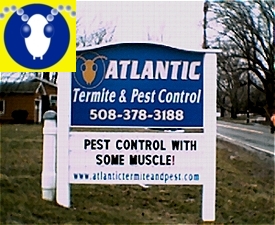
Have an ant problem?
Don't attempt to handle it yourself. Home remedies are sporadically effective, are not permanent or make the issue worse. Call in the pros for a free consultation and estimate. As with all of our services, we'll keep working until your ant problem is wiped out. Safe, approved and effective is how Atlantic works, don't trust your ant problem with anyone else!
The one reason, above all others, for getting rid of carpenter ants is to prevent further structural damage do your home. Carpenter ant colonies expand ever outward, producing what are called satellite colonies. These satellite colonies will eventually mature into hundreds of members and will seek to create more satellite colonies. Atlantic works to eliminate this pattern and prevent further damage to your home
For up to the date news about Atlantic Termite and Pest Control, tips & questions check out The Bug Blog

